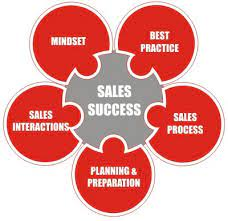
We understand that effective sales coaching is crucial for driving consistent sales success. But what are sales coaching exactly, and why is it essential for businesses? This article will delve deep into the subject and provide a comprehensive understanding of why sales coaching is so.
Sales coaching provides guidance and feedback to salespeople to help them improve their selling skills and performance. It involves working with sales reps individually to identify their strengths and weaknesses, set goals, and develop action plans for achieving those goals. The ultimate goal of sales coaching is to help salespeople become more effective at their job, close more deals, and increase revenue for the business.
There are several benefits to implementing a sales coaching program within an organization. Firstly, it helps to improve the skills and knowledge of the sales team. This can lead to more effective communication with clients and sales. Secondly, it fosters a culture of continuous improvement and learning within the organization. This can increase employee engagement, job satisfaction and lower turnover rates. Finally, it can help identify and resolve issues within the sales process, improving efficiency and effectiveness.
Now, let’s look at the critical components of effective sales coaching.
Building Relationships: The first step to effective sales coaching is building a solid relationship with your sales and other team members. This involves getting to know them personally and understanding their motivations and goals.
Setting Goals: Once you understand your sales team well, it’s essential to set specific and measurable goals for them. This can help provide direction and focus and ensure everyone is working towards the same objectives.
Providing Feedback: Regular feedback is essential for effective sales coaching. It helps to identify areas for improvement and reinforce positive behaviors. When giving feedback, it’s necessary to be specific, objective, and constructive.
Developing Action Plans: After identifying areas for improvement, it’s essential to create action plans to address these issues. Action plans should be specific, measurable, achievable, relevant, and time-bound.
Providing Training and Development: Finally, providing training and development opportunities can help improve the sales team’s skills and knowledge. This can include on-the-job training, mentoring, and formal training programs.
In conclusion, your sales manager’s coaching is essential to any successful sales organization. By building solid relationships with your sales team, setting goals, providing feedback, developing action plans, and providing training and development opportunities, you as sales manager can give tactical coaching to your team meetings to help improve your sales team’s skills and performance, leading to increased revenue and business success.

The key components of effective sales coaching techniques
We’ve covered the key components of effective sales coaching, but how can you implement these strategies within your organization? Here are some practical tips for successful sales coaching:
Schedule regular one-on-one meetings with your top sales rep or team: These meetings should be a safe space for your top sales leaders and representatives to discuss their challenges and successes. Use these meetings to provide feedback, set goals, and develop action plans.
Use data to inform your sales strategy and coaching tactics: Analyze your sales data to identify trends and areas for improvement. Use this information to guide your coaching sessions and develop targeted action plans.
Foster a culture of continuous learning: Encourage your marketing department sales team to seek new information and skills. Provide training opportunities and recognize leadership team members who take the initiative to learn and grow.
Develop a complete coaching strategy and framework: Develop a standardized approach to each coaching session, including clear goals, feedback, and action plans. This will help ensure consistency and fairness in your coaching sessions.
Emphasize the importance of self-reflection: Encourage your sales team members to reflect on their performance and identify improvement areas. This can help to reinforce positive behaviors and improve self-awareness.
Implementing these strategies can help you to create a culture of continuous improvement within your sales team. By providing targeted coaching, setting clear goals, and fostering a learning mindset, you can help your sales team reach new success levels.
In conclusion, effective sales coaching is crucial to any successful sales organization. By building solid relationships with your sales team, setting goals, providing feedback, developing action plans, and providing training and development opportunities, you can help improve your sales team’s skills and performance, leading to increased revenue and business success. Use the practical tips outlined in this article to implement these strategic sales coaching tips and strategies within your organization and have sales development reps drive consistent sales success.

Building a solid relationship with your sales team
As you can see, building a solid relationship with your top sales leader and team is the foundation of effective sales coaching. From there, you, the head sales coach and leader, can set clear goals, provide feedback, develop action plans, and foster a learning mindset, all of which work together to help your sales team succeed.
When implementing these strategies and sales processes within your organization, it’s important to remember that effective sales coaching requires time, effort, and dedication. However, by investing in your sales team and providing them with the support they need to succeed, you can create a culture of continuous improvement that drives consistent sales success.
Effective sales coaching is essential for any sales organization looking to boost revenue and achieve long-term success. By using the ultimate guide to successful sales coaching, building solid relationships with your sales team, setting clear goals, providing feedback and training, and fostering a learning mindset, you can guide sales coaching to help your sales team reach new levels of performance and success. Use the tips and strategies outlined in this article to implement effective sales coaching within your organization and outrank all other sales coaches’ websites in Google searches.

Sales coaching is both an art and an essential aspect of any successful sales team. Good sales coaching involves providing sales representatives guidance, support, and feedback to improve their skills, knowledge, and performance. In addition, practical sales training and coaching require a deep understanding of the sales process and the ability to identify areas for improvement.
Why are Sales Coaching Important?
A sales and coaching program are critical for several reasons. Firstly, it helps to improve sales team performance by identifying areas for improvement and providing targeted training and support. Secondly, it can help increase sales representative motivation and engagement, leading to higher productivity and better results. Finally, it can help to foster a culture of continuous learning and development within the sales team, leading to sustained success over the long term.
Key Elements of Effective Sales Coaching
To be effective, a sales coaching program must incorporate several key elements. These include:
1. Clear Objectives and Expectations
Effective sales coaching requires clearly defined objectives and expectations. Sales representatives must understand what is expected of them, what they need to achieve, and how they will be evaluated. This helps ensure that coaching efforts are aligned with business objectives and that sales representatives work towards the same goals.
2. Regular Coaching Sessions
Regular coaching sessions are essential for maintaining momentum and providing ongoing support for performance improvement. These sessions should be scheduled in advance and provide good discussion and feedback.
3. Tailored Coaching Approach
Effective sales rep training and coaching require a tailored approach for many sales reps. Sales representatives have different strengths and weaknesses, and their training methods and coaching efforts should address specific areas for improvement. This requires a deep understanding of each sales representative’s needs and preferences.
4. Data-Driven Insights
Data-driven insights are critical for effective sales coaching. Sales coaches must have access to relevant data and analytics to identify improvement areas and track progress over time.
5. Continuous Learning and Development
Finally, effective sales coaching requires a commitment to continuous learning and development. To provide the most effective sales coaching tools, sales coaches must stay updated with industry trends, best practices, and emerging technologies.
Best Practices for Sales Coaching
To get the most out of your sales coaching efforts, here are some best practices to keep in mind:
1. Set Realistic Goals
Setting realistic goals is essential for effective sales coaching programs. Goals should be specific, measurable, and achievable within a reasonable timeframe. This helps ensure sales representatives stay motivated and engaged and that tactical sales coaching conversations and efforts focus on achievable outcomes.
2. Focus on Individual Needs
Effective sales coaching requires a focus on sales rep performance and individual needs. Therefore, sales coaches should work closely with sales representatives to identify improvement areas and develop tailored coaching plans. This helps the sales coach to ensure that the coaching plan and efforts are aligned with each sales representative’s unique needs and preferences.
3. Provide Regular Feedback
Regular feedback is critical for maintaining momentum and identifying areas for improvement. Sales managers and coaches should provide positive and negative feedback regularly to help sales representatives improve their skills and performance.
4. Use Data-Driven Insights
Data-driven insights are essential for effective sales coaching. Sales coaches should have access to relevant data and analytics to identify improvement areas and track progress over time. This helps to ensure that sales coaching tips and efforts are data-driven and aligned with business objectives.
5. Foster a Culture of Learning
Finally, effective sales management and coaching requires a commitment to fostering a culture of learning and development within the sales team one on one coaching itself. Sales managers and coaches should encourage sales representatives to continuously learn and develop their skills through coaching sessions and self-directed learning.

Sales coaching is critical for improving sales
Sales coaching is critical for improving sales team performance and driving business success. By providing targeted guidance, support, and feedback, sales coaches can help sales representatives to enhance their skills, knowledge, and performance. Effective sales coaching requires a tailored approach incorporating clear objectives and expectations, regular coaching sessions, data-driven insights, and a commitment to continuous learning and development. By following best practices and focusing on individual needs, sales coaches can help to create a culture of learning and development that drives sustained success over the long term. With the right approach, sales coaching can help to improve sales team productivity, engagement, and, ultimately, results.
To be successful in sales coaching techniques
To be successful in sales coaching, a sales coach needs to establish clear objectives and expectations for the coaching process. This includes defining specific goals for sales scripts, identifying key performance indicators, and establishing a timeline for achieving those goals. Sales coaches should also work closely with account executives and sales representatives to understand their needs and preferences for the selling systems and tailor the coaching approach accordingly.
Regular coaching sessions are also essential for effective sales coaching. By regularly meeting with sales representatives, coaches can provide ongoing guidance and feedback and help them identify areas for improvement. This can help keep sales representatives focused, engaged, and motivated and ensure they progress toward their goals.
Data-driven insights are another critical component of effective sales coaching. By tracking key performance metrics such as sales revenue, conversion rates, and customer satisfaction, coaches can identify trends and patterns that can inform coaching strategies and help sales representatives to improve their performance. This can also assist coaches in identifying potential roadblocks or challenges hindering sales performance and developing targeted solutions.
Finally, a commitment to continuous learning and development is essential for thriving sales coaching programs. By staying up-to-date with the latest sales techniques, technologies, and trends, coaches can provide valuable insights and guidance to their sales representatives and help them to stay ahead of the competition. This can help to create a culture of learning and development within the sales team and drive sustained success in sales calls over the long term.
Effective sales coaching requires a tailored approach incorporating clear objectives and expectations, regular coaching sessions, data-driven insights, and a commitment to continuous learning and development. Our sales consultants and coaches can help improve sales team productivity, engagement, and results by following best practices and focusing on individual needs.

Focusing on specific areas that can make the most significant impact
Focusing on specific areas that can make the most significant impact is essential to improve sales team performance through coaching further. Some of these areas include:
Goal setting and planning: Effective sales coaching should involve setting clear, measurable goals and developing a plan to achieve them. This can help sales representatives focus their efforts, prioritize tasks, and stay motivated.
Sales coaching model for process improvement: Sales coaches can help to improve sales performance and identify areas of the sales process that may be causing inefficiencies or barriers to success. Sales representatives can work more effectively and achieve better results by optimizing the sales process.
Skill development and sales management: Sales training and coaching can help sales representatives improve their skills in communication, relationship building, and negotiation. This can be sales managers’ investment to help them become more effective at closing deals, engaging with customers, and closing sales.
Product knowledge: Sales coaches can help sales representatives develop a deep understanding of the products and services they sell. This can help them to answer customer questions and address objections more effectively, leading to increased sales.
Sales team collaboration: By promoting collaboration and teamwork, sales leaders and coaches can help to create a culture of support and learning within the sales team. This can lead to improved performance on sales calls and better results for the entire team.
In addition to these areas, it is essential for sales coaches to also focus on building solid relationships with their own sales teams and representatives. By establishing trust and rapport with individual sales reps and teams, coaches can create an environment where sales representatives feel comfortable seeking guidance and feedback and teach agents are more likely to be receptive to coaching.
By focusing on these critical areas and building solid relationships with struggling sales reps, sales coaches can help improve sales team performance and drive business success. With a commitment to continuous learning and development, sales coaches can stay ahead of the competition and help their sales representatives to achieve their full potential.
CoopBusiness is a revolutionary cooperative business-building platform that empowers individuals to become entrepreneurs, business owners, and financially independent.
As a member, you’ll receive top-level business mentorship, access to our proprietary business systems, and the opportunity to access the funds you want to turn your business ideas into reality.